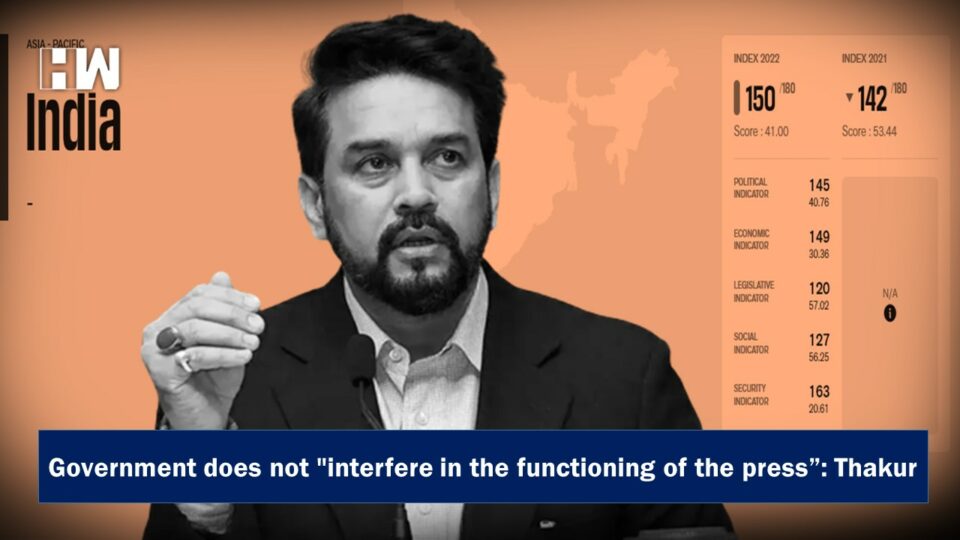The union government today, responding to questions in Parliament regarding the steep fall in India’s Press freedom ranking released by the Reporters Without Borders, said it “does not subscribe to its views and country rankings and does not agree to the conclusions drawn by this organisation”.
Along with TMC MP Mala Roy, two DMK MPs A Raja and A. Ganeshamurthi had posed several questions to the government regarding the press freedom ranking, reasons for the degrading press freedom, and the steps taken by the government to deal with the same.
Ms Roy, Mr Raja and Mr Ganeshamurthi had asked:
“Will the Minister of INFORMATION AND BROADCASTING be pleased to state:
a) whether it is a fact that India ranked in the bottom 30 worst nations out of 180 as maintained by the media watchdog in the World Press Freedom Index; b) if so, the reasons therefor;
c) whether the Government has made any analysis of the reasons due to which press freedom is on the decline and if so, the steps taken to restore it;
d) whether the executive is using unfettered powers through various laws like National Security Act, IPC Sedition Law, UAP Act., etc., to gag the freedom of journalists and threaten them;
e) if so, the number of complaints received by the Government and Press Council of India in this regard, during each of the last three years and the current year; and
f) the details of action taken by the Government in each such complaint?”
Anurag Thakur, the Union Minister of Information and Broadcasting, responded to the questions posed in this matter. Highlighting the fact that the World Press Freedom Index is published by a “foreign Non Government-Organization, “Reporters Without Borders””, Mr Thakur said: “Government does not subscribe to its views and country rankings and does not agree to the conclusions drawn by this organisation for various reasons including very low sample size, little or no weightage to fundamentals of democracy, adoption of a methodology which is questionable and non-transparent, etc.”
Mr Thakur, stressing that the government does not “interfere in the functioning of the press”, said: “Press Council of India (PCI), a statutory autonomous body, has been set up under the Press Council Act, 1978 mainly to preserve the freedom of the Press and improve the standards of newspapers and news agencies in the country. PCI considers complaints filed ‘by the Press’ concerning curtailment of press freedom, physical assault/attack on journalists etc. under Section 13 of the Press Council Act 1978 and processed under the provisions of Press Council (Procedure for Inquiry) Regulations, 1979. PCI is also empowered to take suo-motu cognizance in matters on the pressing issues concerning freedom of Press and safeguarding of its high standards.”
“Central Government attaches highest importance to the safety and security of all residents of the country including journalists. The Ministry of Home Affairs have issued advisories to States and UTS, from time to time, to maintain law and order and ensure that any person who takes law into his/her own hand is punished promptly as per law. An advisory specifically on safety of journalists was issued to States/UTs on 20th October, 2017 requesting them to strictly enforce the law to ensure safety and security of journalists/ media persons etc,” Mr Thakur said.
Earlier, responding to question regarding arrests of journalists across the country, the government told parliament that it has no data on arrests of journalists across the country. This comes in the backdrop of international condemnation over the arrest of Alt News co-founder Mohammed Zubair, who has been booked in multiple cases over his old tweets.
Nityanand Rai, the minister of state in union home ministry, responded to the question and said: “‘Police’ and ‘Public Order’ are State subjects under the Seventh Schedule to the Constitution of India and State Governments are responsible for prevention, detection and investigation of crimes and for prosecuting the criminals through their law enforcement agencies. The National Crime Records Bureau (NCRB) does not maintain specific data with respect to arrest of journalists.”
As an independent media platform, we do not take advertisements from governments and corporate houses. It is you, our readers, who have supported us on our journey to do honest and unbiased journalism. Please contribute, so that we can continue to do the same in future.

